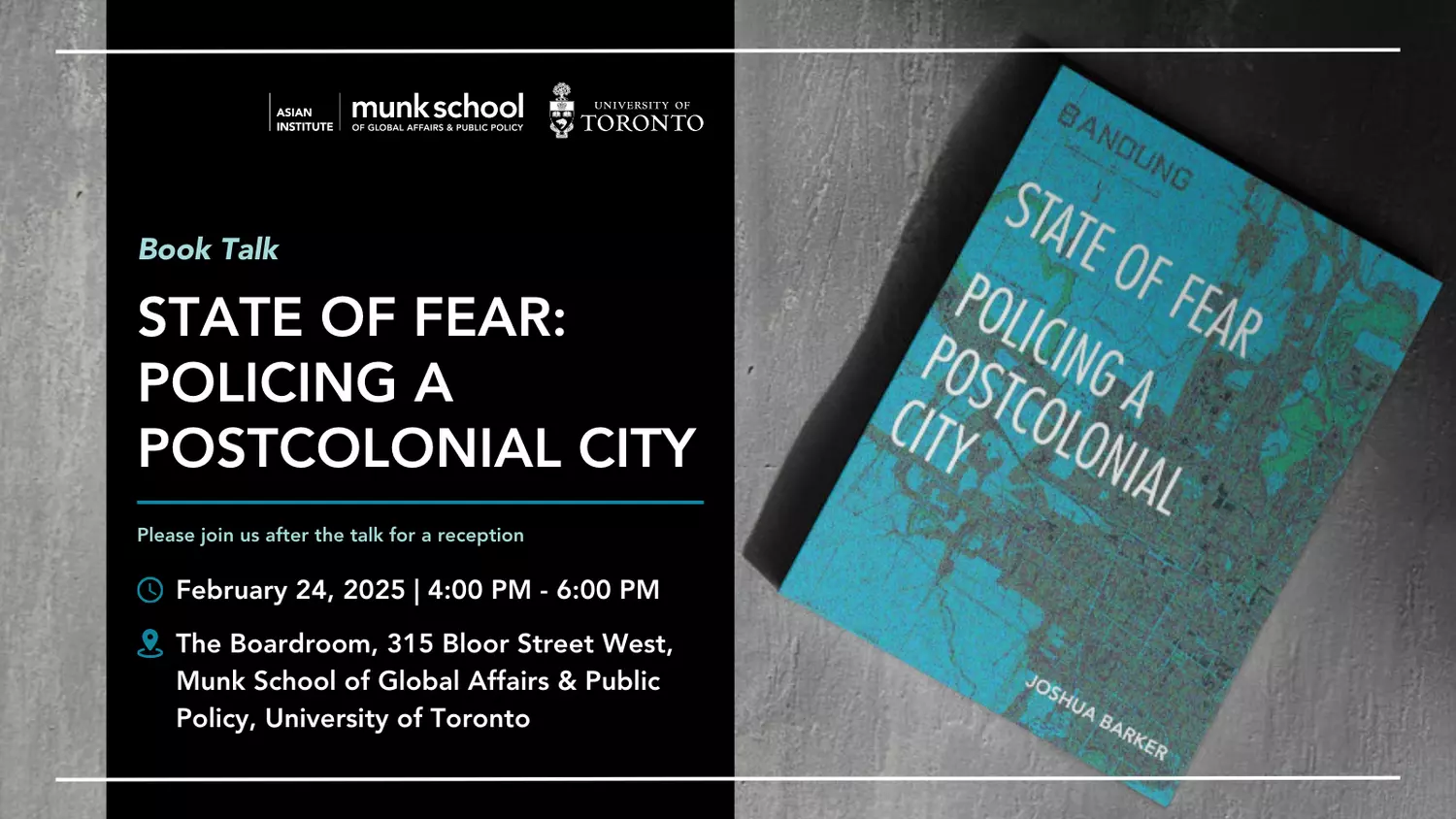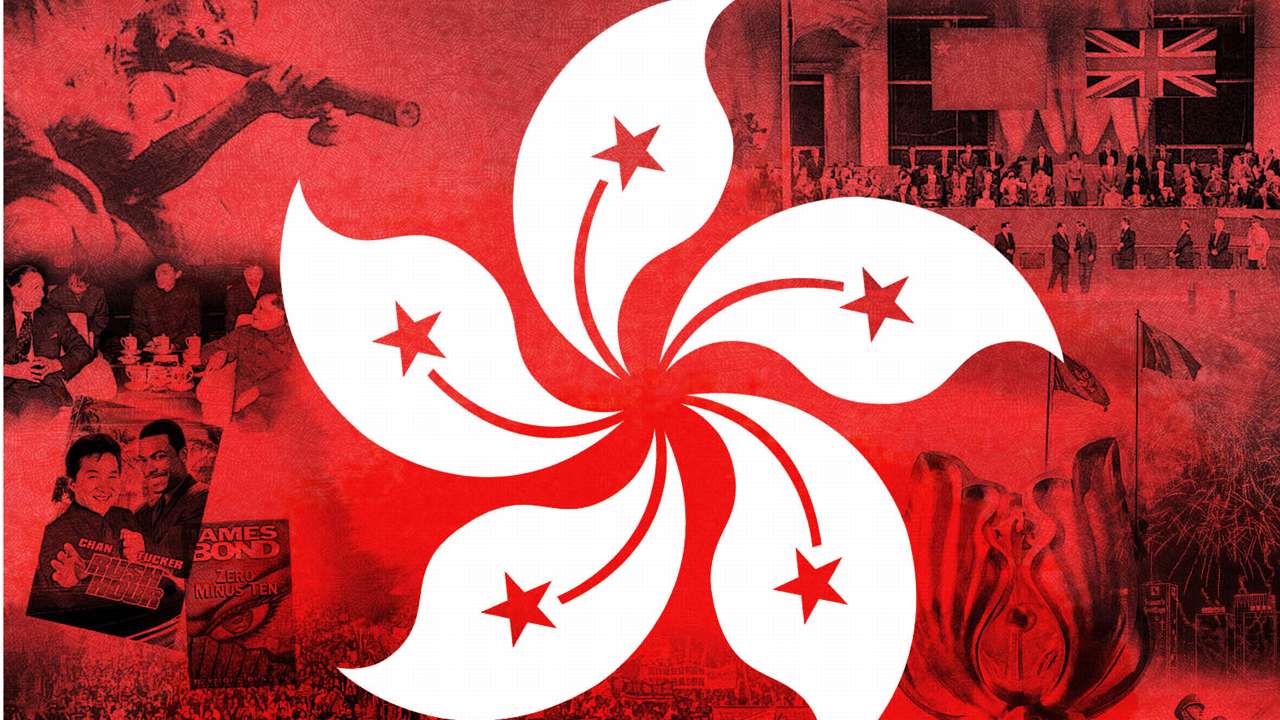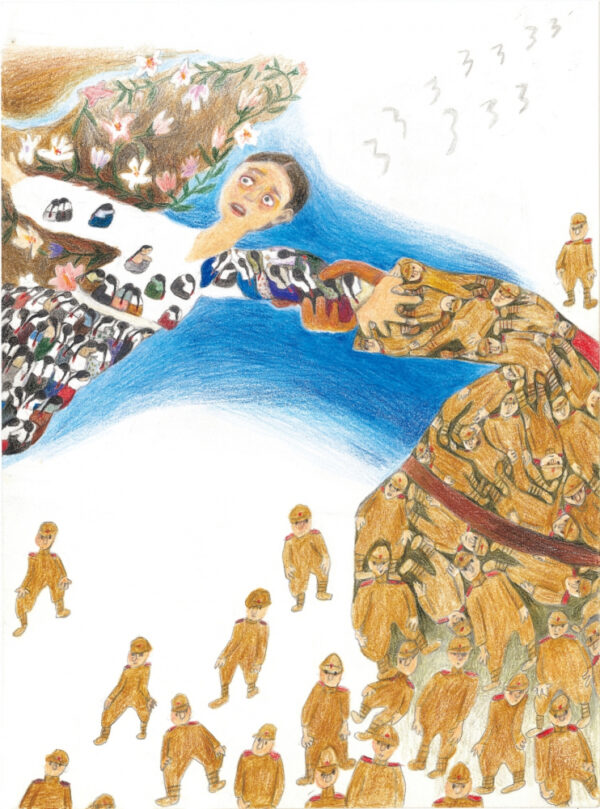On February 24th at The Boardroom of the Observatory, speakers Joshua Barker, Danilyn Rutherford and Abidin Kusno delivered a panel at the Munk School of Global Affairs & Public Policy discussing Barker’s book “State of Fear: Policing a Postcolonial City”. Barker shows us how fear and violence are produced and reproduced through everyday practices of rule and control, through ethnographic and historical genealogies of Indonesian policing with a specific focus on the city of Bandung. In the book, Barker traces the complex relationship between the state and vigilante groups such as neighborhood watch patrols and street gangs. Through interviews, he uncovers a struggle between two visions of social control that continues to dictate policing in Indonesia; the state’s bureaucratic approach and the city’s territorial approach dividing the city into fiefdoms. Overall the book reveals how authoritarianism can take root not just from the top down but also from the bottom up.
Joshua Barker is a Professor of Anthropology at the University of Toronto, Dean of the School of Graduate Studies and Vice-Provost of Graduate Research & Education, University of Toronto, and Affiliate of the Asian Institute, and co-editor of Figures of Southeast Asian Modernity and State of Authority: State in Society in Indonesia. His research focuses on Indonesia, examining themes on three main topics of interest: urban studies, crime and security, and new technologies. Danilyn Rutherford is the President of the Wenner-Gren Foundation for Anthropological Research and previously the associate professor of anthropology at the University of Chicago and more recently the professor of anthropology at the University of California, Santa Cruz. She is the author of Raiding the Land of the Foreigners and Laughing at Leviathan. Abidin Kusno is a Professor in the Faculty of Environmental Studies at York University and the former Director of York’s Centre of Asian Research (YCAR). His research interests include global cities, urban/suburbanism, politics and culture, history and theory of architecture, urban design and planning, nationalism, colonialism and post-colonialism, and Asian studies with a particular focus on Indonesia.
The event chair was Emily Hertzman, a research associate in the Department of Anthropology at the University of Toronto, and the Ethnography Lab Coordinator at the University of Toronto. She is a sociocultural anthropologist whose research focuses on mobilities, identities, religious practices, and politics with a Ph.D. in Anthropology from the University of Toronto, as well as a B.A. and M.A. from the University of British Columbia. The event was sponsored by the Asian
Institute, Munk School of Global Affairs & Public Policy and co-sponsored by the Department of Anthropology and the Ethnography Lab at the University of Toronto.
The panel begins with a brief introduction by the event chair Emily Hertzman, introducing the speakers of the panel as well as a brief introduction to the book and its contents. She then passes on to Danilyn Rutherford, who begins with key words in relation to the book, such as: postcolonial, authoritarianism, activism, advocacy etc. Rutherford gives a lengthy summary of the book’s chapters as well as its analysis, analyzing Barker’s arguments. She notes Barker’s book’s purpose in documenting the existence of street level sovereigns, with street levels of sovereignty through various vigilante groups that are involved in the policing of the city; This creates a state of fear showing us how states perform sovereignty. Barker notes two modalities
and the interplay between them: territoriality and surveillance. In territoriality, the neighborhood becomes the basis of political control through local interests and associations breeding local sentiment, with the Ronda (represented the institution of the neighborhood watch) organized as the level of the smallest unit of government administration. This neighborhood is prone to fear, leading citizens to acts of vigilante violence (“to play judge themselves”), with the thief and phantom state fighting against the sovereignty and autonomy of territorial neighborhoods. While in surveillance, three kinds of work (acquiring knowledge useful to governance, creating a blueprint for an ideal urban order, and establishing mechanisms for making that blueprint of order a reality) sought to reorder the city of Bandung, which constitutes a panopticism, having an effect on the city overall and giving authorities control to enforce the city, creating the state of fear. Danilyn Rutherford concludes her talk with a comparison of the book’s content to the U.S. in relation to the themes and contents of Indonesia’s Bandung.
Next, Abidin Kusno begins his talk, praising the book and its contents, discussing the book’s ethnographic methods and historical accounts. He notes that the book is very timely and is relevant for Indonesia, considering the time periods of the book under Suharto as well as the historical impact of Dutch colonization on city and neighborhood structures. Because of this the book is able to offer a basic understanding of the Indonesian state in colonial times as well as the contemporary modern period, as well as understanding that the book is trying to capture the middle as a form of governing society. Kusno especially notes how Indonesia is seeing a sign of returning to authoritarianism similar to the dictatorship under Suharto, with lots of local stories of police and their enforcing power, and militarism, which creates another state of fear apt to the book. Kusno especially is appreciative of the book and notes the deep exploration and insights into the interconnected cultures, historical accounts, ethnographic content of Indonesia, and found the book very engaging and highly recommends the book.
Then, Joshua Barker the author himself comments on his book and speaks of a few points. One personal point is that he speaks of an acquaintance who assisted in resistance against Suharto regimes, whom has regrets due to not being able to succeed in conveying political awareness and the passing along of knowledge to the next generation (in the political context), and saw a failure of the historical transmission of the new world order, where the acquaintance believed democracy was there to last and the authoritarianism → democracy transition had already happened. Barker himself comments that his book is fundamentally anchored with the way it was composed, being very centered and analytical in its fundamental argument and getting its point across, and Barker uses the basis of the book’s arguments to extend onto the state of the United States’ situation today, with the rise of increasing authoritarianism, militaristic policing which creates a similar “state of fear” in the USA with Indonesia’s Bandung.
Lastly, the panel ends with an engaging Q&A session, with various questions being asked by the audience in further discussions to the implications and themes of the book, the contents regarding the book as well as its research methods, as well as its applicability to other cities in countries across the world, such as Myanmar and the United States.
We would like to thank the Joshua Barker, Danilyn Rutherford and Abidin Kusno for their brilliant insights into “State of Fear: Policing a Postcolonial City”, as well as the event chair, the Asian Institute of the Munk School of Global Affairs & Public Policy & the Department of Anthropology and the Ethnography Lab at the University of Toronto for their time and effort in hosting, moderating and sponsoring this panel.
Leo is a fourth year undergraduate student majoring in Political Science specialist and Contemporary Asian Studies major. His research interests include the geopolitics and international relations side of political science, with a special focus on East and Southeast Asia both domestically and internationally. He is super excited to be the event reporter for Southeast Asia, reporting on Munk School events that help expose and facilitate discussions and knowledge on socioeconomics and politics of the SEA region.








